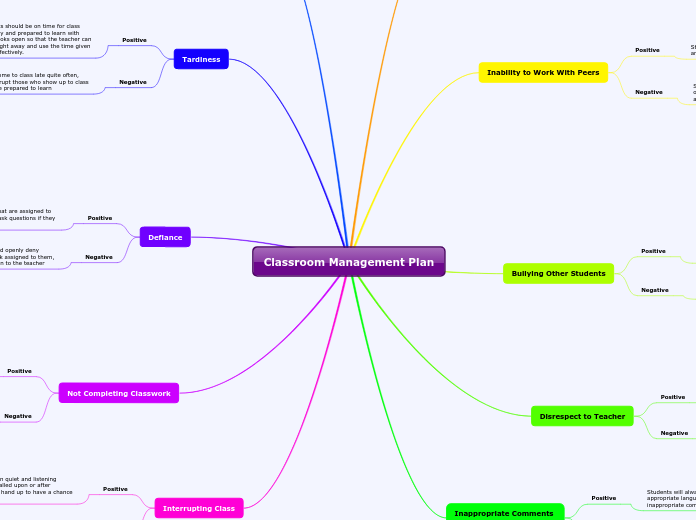af Sean Murray 5 år siden
765
Classroom Management Plan

af Sean Murray 5 år siden
765

Mere som dette
A noun is a word that functions as the name of some specific thing or set of things, such as living creatures, objects, places, actions, qualities, states of existence, or ideas.
Compound nouns are words where two nouns have been stuck together to make a new noun. Compound nouns should be written as one word, without a hyphen.
Teacher Response: Teacher will warn disruptive students a few times before having a quick conversation outside the classroom, if activity continues, they will follow the school policy regarding interrupting class
Teacher Response: Teacher is able to continue an interruption free class and provide the best lesson they can due to students being attentive and listening
Generic nouns are nouns that are part of a generic statement. Generic nouns can be singular or plural. The opposite of generic nouns is collective nouns.
The difference between definite/indefinite and generic nouns is that in the sentence there must be a blanket statement or question.
Teacher Response: Teacher will discuss the issue with the unprepared students, and as for discipline, the teacher can hold those students out of related activities regarding the homework until they complete the work that was assigned to them
Teacher Response: Teacher is allowed to continue with lessons due to students being up to date with homework and content. Can provide incentive for completing work like allowing students to participate in class activities related to homework
Proper nouns are the names of specific people or places. They should always begin with a capital letter.
Teacher Response: Teacher will speak with the students who are acting defiant towards the teacher. If problems persist, school policies will dictate further disciplinary measures
Teacher Response: Teacher will give bonus points towards a class goal of a reward, for doing all tasks and listening to the teacher at all times. Will provide praise for not having any issues.
A concrete noun is a noun that can be identified through one of the five senses (taste, touch, sight, hearing, smell).
Teacher Response: Teacher will have a conversation with the students who repeatedly show up to class late and then if the behavior continues, will follow class or school policy regarding disciplinary measures
Teacher Response: Teacher will give praise and provide incentive and rewards for those students who consistently are on time and prepared to learn in class
Possessive nouns are nouns which possess something, normally another noun.
Teacher Response: Teachers who have students who are cheating on schoolwork, should follow the school policy for cheating. If there is not a policy set in place for cheating, the teacher should have a conversation with the student, as well as a conversation with the parents of said student.
Teacher Response: Teacher should praise students for completing their own work to the best of their abilities
Countable nouns are nouns that can be counted, even if the number might be extraordinarily high.
Uncountable nouns are nouns that come in a state or quantity which is impossible to count; liquids are uncountable, as are things which act
like liquids.
Teacher Response: Teacher will have conversation with those students who are using language or comments that are not classroom appropriate, warnings will be giving until further measures are needed
Teacher Response: Teacher will have no problems dealing with students who may be speaking inappropriately
Common nouns are words for people, places or things that aren’t specific (as opposed to a proper noun which refers to only one person, place or thing).
Common nouns can be countable or uncountable, singular or plural.
Teacher Response: Teacher will talk to students that are being disrespectful and explain to them the drawbacks of acting that way. Teacher may need to speak with administration regarding further discipline
Teacher Response: Teacher will return the respect that is given to them, back to their students and everyone can progress through the class positively and healthily
A noun which refers to a group of things/people.
Teacher Response: Teacher will explain to students who are bullying others, that they need to know how those actions make people feel about themselves. That it does not help maintain a good positive classroom for all. Teacher will follow school disciplinary measures regarding bullying
Teacher Response: Teacher does not have to take any actions regarding discipline with bullying. May want to provide incentive for maintaining a positive learning environment
A noun which cannot be identified by using one of the five senses (taste, touch, sight, hearing, smell).
Teacher Response: Teacher will stop the class and warn the groups that are off topic that they need to get back to the work at hand, if the behavior continues, teacher may wish to break the group up and have those students do the work individually or for homework
Teacher Response: Teacher is able to use this method of group work to help further deliver content, because peer teaching is an effective way of learning. Teacher may give prizes for best groups
Irregular nouns are nouns which don’t follow a spelling pattern when pluralized.
Teacher Response: Teacher may wish to look around for the student that is missing, if found they will want to have a conversation with the student about where they need to be at that time. Further disciplinary action may be required if behavior continues.
Teacher Response: None really needed